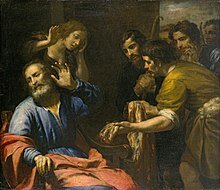The fine art of snarkiness has ancient roots. Take a look at the Torah portion, Miketz. I think I found there a Torah of snark.
There is a time of famine in Canaan. Egypt is buffered from the hunger by the careful planning of Joseph as Pharaoh’s second in command. Jacob has “heard” that there is food available in Egypt.
An elderly Jacob remains the strong but irascible patriarch of the family. At Genesis 42:1 we read: “Jacob saw that there were food rations to be had in Egypt, he said to his sons, why are you [just] looking at one another?” It reminds me of the absurd line in Alice in Wonderland, when the white rabbit turns to a flummoxed Alice and says: “don’t just do something, stand there!” Snark at its finest has both a crudely critical tone with a dash of absurdity. But can it serve a spiritual purpose?

Jacob and his sons.
Let’s look at the words. לָ֖מָּה תִּתְרָאֽוּ lama titraoo. The word titraoo is a reflexive form of the verb to see, conveying that the action is directed internally. Rambam expands the phrase to mean: “Why are you looking at one another as if each one of you hopes that another one would go to buy food?” We don’t have such a rich and complex verb form in English. In a single word, the Hebrew expresses the passivity that comes when a group despairs. Finding no motivation to act within themselves, each one keeps looking to the others. Ultimately, none know what action to take. Here, the word underscores Jacob’s annoyance with the family inactivity in the plural.
Why are they passive? These are the sons who threw their brother Joseph in a pit and sold him into slavery. These are the sons who attacked Shechem and killed its residents. But, when confronted with an existential challenge like famine, each one just looks to the next. None step forward, even when the family is imperiled. The disease of immorality has an outward trajectory. With a hollow core, positive action is impeded.
Jacob was different than his sons in both his wisdom and faith. And here’s the juicy bit of Torah to share with you. The verse begins, “Jacob saw that there was food in Egypt.” Without a smart phone, television or binoculars, Jacob could not have seen Egypt no less its food supplies. Obviously, Jacob heard this news from travelers or traders. Perhaps the Torah’s use of the verb “to see” has double duty here. First, it indicates that Jacob is prescient. After all, this is the Jacob who wrestled with angels and spoke with God. His “seeing” Egypt is a foreshadowing of the chapters to come, more than just noting a source of food. Upon seeing that food was available in Egypt, it was obvious to Jacob that his sons must make the journey to purchase food (where they will again meet Joseph).
The other deployment of the word “to see” is the contrast to the second use of the verb in the same sentence. While the spiritually advanced Jacob can see the bigger picture and know what action to take, his morally lacking sons can’t see beyond themselves. These sons lack Jacob’s spirit, confidence and gumption. Instead of being resourceful, they are indolent.
Jacob’s snarkiness underscores the peril of being spiritually lacking. Jacob is not only asking why haven’t you gone to get food. He is also chiding his sons to wonder what is lacking in their character. People of poor moral character don’t take responsibility in times of challenge, they look to blame others. The caustic quality of the snarky remark highlights ethical depravity.
Please don’t take this as a license to be sarcastic or obnoxious yourselves. Better that we ask ourselves why we are just standing there when there are perilous times ahead for our country, our planet, and us. Hear Jacob’s snarkiness as a call to be our best selves and act on the moral imperatives of the day.
Rabbi Evan Krame




